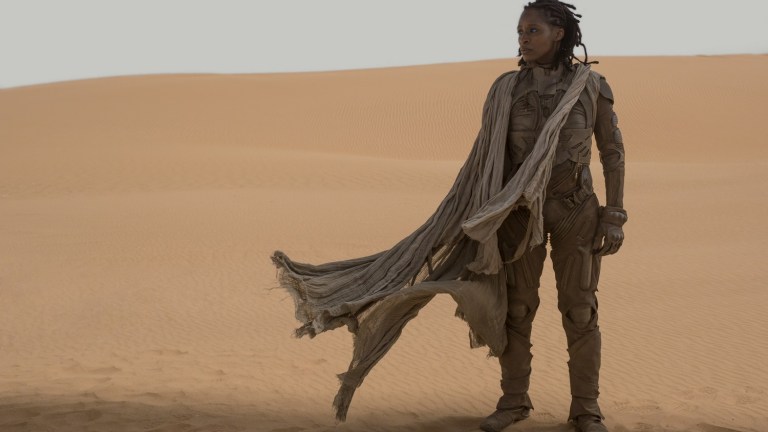Why Dune Changed the Gender Of One Key Character
Dune actress Sharon Duncan-Brewster explains how her character switched from a man to a woman.

One of the notable differences between book and novel in director Denis Villeneuve’s upcoming film version of Frank Herbert’s Dune — for those who have read the 1965 sci-fi classic — is that the character of Dr. Liet-Kynes is a man in the novel but a woman in the movie, where she is played by British actress Sharon Duncan Brewster.
Dr. Kynes, in the story, is an inhabitant of the world known as Arrakis and its official Imperial Planetologist, with the goal of studying the arid, harsh planet and possibly one day terraforming it for a more temperate climate. Kynes also serves as the liaison between the planet’s new administrator, Duke Leto Atreides (Oscar Isaac), and the planet’s native people, the Fremen.
When an attempt is made by the rival Harkonnen family to wipe out the Atreides clan and seize control of Arrakis and its valuable supply of the substance known as the spice, another side to Kynes’ personality is revealed, while young Paul Atreides (Timothée Chalamet) begins a relationship with Kynes’ daughter, the Fremen warrior Chani (Zendaya).
“I think first and foremost, Denis was adamant that we just concentrate on what Kynes represents,” said Duncan-Brewster (Rogue One) when asked about the change in Kynes’ gender. “Thematically, he’s an integral role. He connects all the dots. He connects the Harkonnens, he connects House Atreides, he connects the Fremen, planet Arrakis, the sandworms.
“This is somebody who understands all these worlds and moves in between each and every one, seemingly with one agenda,” added Duncan-Brewster. “However, as things go, we start to understand that there is more game playing or survival or preservation for the good of certain people or individuals or beings.”
In other words, it was the inner workings of Kynes — the doctor’s actions, motivations and beliefs — that Villeneuve and Duncan-Brewster focused on, intuitively guessing that the character’s gender was not as integral to the role.
“As far as Denis was concerned, it was all about concentrating on the essence of this person, not the fact that this person was a man, so that’s what we went with first,” said Duncan-Brewster. “Then we talked much later about the fact that Kynes was a man. To me and to Denis, it’s arguable and I’m intrigued to see what the fans will make of it. I’m excited to see how it all comes out, because I don’t think it matters that Kynes in the book is a man. I think what’s important is what Kynes stands for, and that’s definitely what Denis stayed true to.”
It remains to be seen what diehard Dune readers think of the gender swap, but it’s a tribute to the universality and complexity of the book’s characters — and the inclusive creative climate surrounding films these days — that such a move would be considered at all. This is a fresh take on Dr. Kynes — a role once played by the legendary Max von Sydow — and we’re intrigued to find out what Sharon Duncan-Brewster and Denis Villeneuve have done with it.
Dune is slated to arrive in theaters on December 18.
